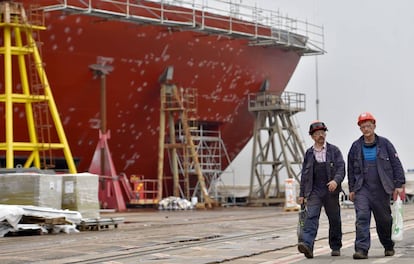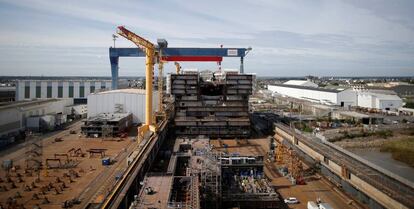Two Polish salaries for every French paycheck
More than two million Europeans work in other EU member countries, some of them with “unacceptable” wages, schedules, or physical strain— all to reduce company costs


One day, the heads of a company sent Fran Martínez to install pipes in France. The project was promising, but what he found when he arrived was not what he had expected. He was placed in a house to share with all of his co-workers, where the unluckiest of the lot had to sleep in the hallways. “The situation for Spaniards in France is deplorable, but for the Polish or Romanians it’s downright criminal,” he asserts. “Everything they put on your payroll is a lie,” says a 42-year-old Galician worker, who spent four months building supermarkets in Paris and another four in Saint-Nazaire, a small French city located at the mouth of the Loire River.
Once a symbol of national industry pride, the shipyards of Saint-Nazaire have now become hosts for a paradigm that the EU is looking to put an end to: displaced workers migrating to member countries, willing to accept lower wages and terrible working conditions. There, they hope that what was laid out in the Brussels agreement – that migrant workers will be incorporated into the local workforce – will ring true in the near future.
Alain Georget is one of the 8,000 workers who earns a living by working on the Saint-Nazaire shipyards, on which, until recently, liquid natural gas tankers and helicopter carriers were being built. “Working conditions for the French workers are really rough: they have to physically strain themselves to no end, earn insufficient salaries and have bad schedules," Georget explains. "But for displaced workers the situation is usually much worse.”
Once a symbol of national industry pride, the shipyards of Saint-Nazaire have now become hosts for a paradigm that the EU is looking to put an end to
Terrible conditions, vulnerability, and job insecurity are all things that have made contacting on-site workers difficult, since they are wary about appearing in this article, which forms part of the journalist-led initiative Citizens' Europe, funded by the European Parliament.
The free movement of workers makes up one of the three fundamental pillars of the EU. Two million European workers are sent off to other member countries by their employers. In Germany, a third of the 30,000 workers in slaughterhouses is made up of waves of migrants from southern or eastern Europe. Companies based in Luxembourg have hired a number of French workers only to later send them back to their home country, in order to save on welfare expenses. Within Belgium's construction industry – of which a third of workers are displaced – there have been cases of 22 levels of subcontracting. Some companies have put the wage gap between their oldest members and new migrant hires through the wringer; taking advantage of the fact that the statistics on regulating displacement are outdated by about 20 years and reforms have yet to be implemented.
The displaced worker, after being hired in their home country – not to be confused with the EU citizen who voluntarily migrates to look for a new job in another member state – should benefit from the same contracts as their native EU member-country counterparts, according to the Brussels agreement passed in October, which will still take years to go into effect. The EU maintains a basic principle in this reform: you get the same pay for the same job in the same place. An example of this would be Slovakian workers subcontracted in Vienna who now have the right to the same Christmas bonus that their Austrian co-workers receive.
There is a lack of French license plates in the Saint-Nazaire employee parking lot, but there is an abundance of trucks from Poland, Hungary and the Baltic countries. It's also easy to find some Spanish, Portuguese, or Greek cars, and even some from non-EU member countries such as Serbia or Ukraine. The trade unions calculate that there are more than 2,000 displaced workers in Saint-Nazaire. “The shipyard has become a Tower of Babel. It is complicated and inefficient to work with people who you can’t communicate with,” explains Georget, who is a trade union delegate of the General Confederation of Labor.
Many of the displaced welders or carpenters in Saint-Nazaire are unaware of their rights since the Brussels agreement, and are tricked into working more hours than the established ones in their contract,
The architecture and the urban layout of Saint-Nazaire can make a visitor think that this city of about 70,000 inhabitants lacks historic value. The 18-by-300-meter concrete mass on the oceanfront says otherwise. This Nazi-engineered powerhouse was built during the German occupation to house and repair part of the German fleet in the Atlantic. The submarine base became a prominent bomb target of the Allies, and by the end of the war the city was in ruins and deserted.
Despite this, the base resisted and the small contingent of Nazi troops in Saint-Nazaire was the last group to surrender in all of Western Europe, a year after the liberation of Paris and two weeks after Hitler’s suicide. Saint-Nazaire, also an old slave-trade port, shifted its focus to the Atlantic again after the war. Today, this is where the biggest cruise ships in the world are built.
The shipyards never close down – there is always someone working long hours. Many of the displaced welders or carpenters in Saint-Nazaire are unaware of their rights since the Brussels agreement, and are tricked into working more hours than the established ones in their contract, according to Georget. He believes that labor investigations should uncover further corruption in the industry to work in concert with these new accords. “The signed contract may be legal, but when it comes to displaced workers, the promises they contain are almost never realized," he says. “Those of us hired in France work a 35-hour week while displaced workers are willing to work 50 hours for less money."

For the most part, displaced workers in Saint-Nazaire live a simple, routine life. Most of them do not stay for more than a year. Despite their labor conditions being worse than their native co-workers', some of the displaced potentially increase their monthly income up to four times in their home country just by earning French minimum wage. Their goal is to save as much as possible and return to their country to continue working for the same company, something that trade unions consider a roadblock when it comes to reporting these cases.
The efforts to reach an accord in Brussels have highlighted divergences between East and West. French president, Emmanuel Macron, took the issue as his first cause célèbre in Europe, and managed to impose limits to the viability of the reached accord. “We have put a stop to big companies who hire from a foreign workforce with the only objective being to reduce production costs,” says Anges Jongerius, a Dutch eurodeputy. Jongerius stresses that there are displaced workers who live under “unacceptable” conditions and that when the reform gains momentum, the employers will have to pay their workers’ living and transportation costs. In Poland the reform has been rejected, where there are arguments about the consequences of being part of a single market – one being that there is a cheap labor force. Hungary, Lithuania and Latvia have adamantly supported Warsaw.
The unemployment rate in Saint-Nazaire is over 10%, a rate slightly over the regional (Pays de la Loire) and national average. Along with the port and the shipyards, an Airbus plant employs 3,000 more people. “The displacement of workers and the salary or labor dumping that takes place makes it difficult to hire local young people,” says Xavier Perrin, deputy mayor of the city. He claims that the dishonest use of displaced workers promotes ideas of nationalism and populism. The socialist politician argues that with the large number of French people who move to Saint-Nazaire to work in their industries, the region should update and adapt job training to local needs.
The measures approved in Brussels will increase the cost and administrative burden of displacement. However, these costs only represent 0.9% of the European workforce and only 0.4% of workers are in countries with a minimum salary that is better than their home country’s, because of which their economic impact on a global scale is very limited. Nevertheless, in Saint-Nazaire, employees believe that these measures will have a great economic impact and finally end unequal salaries. Martínez, who ended up leaving the Galician company for not getting paid overtime in France, hopes that employees will no longer feel discriminated in Europe because of their nationality.
An Elpais.cat project
Since November 2016, the Catalan edition of EL PAÍS, Elpais.cat, has been publishing a selection of news stories in English.
The texts are prepared by journalism students at the Pompeu Fabra University (UPF), who adapt content from EL PAÍS, adding extra information and explanation to these stories so that they can be understood in a global context.
This article was translated by Andrea Balart, Irina Balart and Maria Altarejos, and edited by the team at EL PAÍS English Edition.